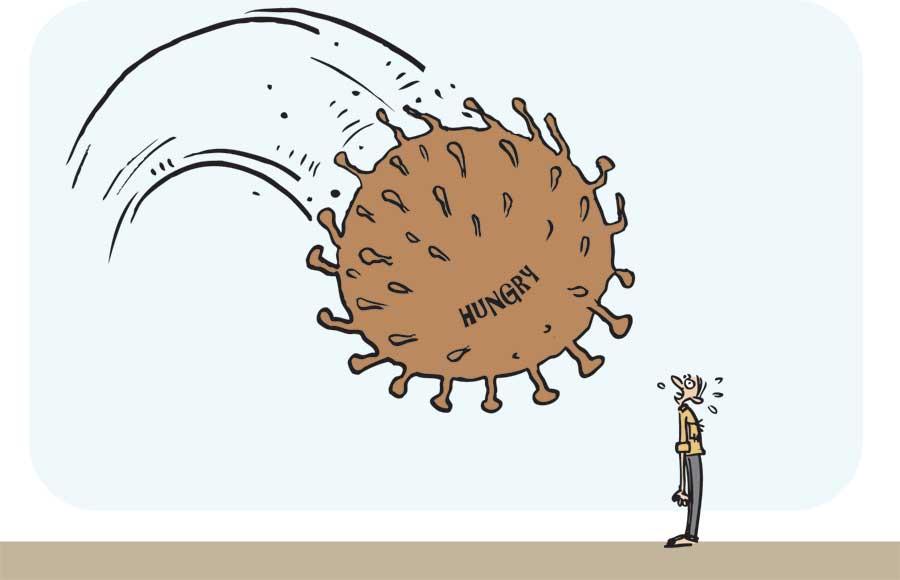16 Oct 2020 - {{hitsCtrl.values.hits}}

Food is essential for human life and it is also important for us to examine the quality of food we eat, especially what we give to children. We need to check carefully on the nutritious value of the food we eat. In recent months there has also been an unprecedented increase in the cost of living with reports of shortages of rice and coconut prices rising as high as the coconut trees. For years governments have pledged to take effective measures for Sri Lanka to grow most of the food we need, but these attempts have not borne much fruit. As a result, food imports are increasing. There were reports this week of the import of hundreds of thousands of tins of canned fish which had been kept beyond their expiry dates.
Besides being forced to import food and even cattle, we also face a situation where harmful preservatives are being used to keep vegetables, fruits and other food items for longer periods. Some reports say, Malaria-fighting-Malathion is being used as a preservative for apples and other fruits. Even the nourishing Gotukola, Mukunuwenna and other leafy vegetables are known to be polluted with preservatives that are not fit or are dangerous for human consumption.
Today, the United Nation’s Food and Agriculture Organisation marks World Food Day. In a statement, the Rome based organisation says the day is being marked amidst unprecedented circumstances.
It says the COVID-19 global health crisis has been a time to reflect on the things we truly cherish and our most basic needs. These uncertain times have made many countries rekindle their appreciation for a thing that some take for granted and many go without – Food.
Food is the essence of life and the bedrock of our cultures and communities. Preserving access to safe and nutritious food is and will continue to be an essential part of the response to the COVID-19 pandemic, particularly for poor and vulnerable communities, which are hardest hit by the pandemic and the resulting economic shocks.
According to FAO at a moment like this, it is more important than ever to recognise the need to support our food heroes – farmers and workers throughout the food system – who are making sure that food makes its way from farm to table, even amidst disruptions as unprecedented as the current COVID-19 crisis.
In recent decades, the world has made significant progress in improving agricultural productivity. Although we now produce more than enough food to feed everyone, our food systems are out of balance. Hunger, obesity, environmental degradation, loss of agro-biological diversity, food loss and waste and a lack of security for food chain workers are only some of the issues that underline this imbalance. As countries begin to develop and implement COVID-19 recovery plans, it is an opportunity to adopt innovative solutions based on scientific evidence so they can build back better and improve food systems making them more resistant to shocks, the FAO says.
Accordingly, World Food Day calls for global solidarity to help all populations, and especially the most vulnerable, to recover from the crisis, and to make food systems more resilient and robust so they can withstand increasing volatility and climate shocks, deliver affordable and sustainable healthy diets for all, and decent livelihoods for food system workers. This will require improved social protection schemes and new opportunities offered through digitalisation and e-commerce, but also more sustainable agricultural practices that preserve the earth’s natural resources, our health, and the climate.
The world social justice movement OXFAM in a statement says, the COVID-19 pandemic has changed everything – including what and how we eat. Some people face long lines at supermarkets, others can’t buy food. Favourite restaurants have been shut down. With street and food markets closed, many producers couldn’t sell their produce. Countless family meals were missed, and millions have been pushed into hunger.
Throughout all of this, farmers and food workers, were the true heroes, toiling on the front lines in fields and factories, to provide food. But all too often they worked in dangerous conditions, for poverty pay; especially women – despite giant food companies making millions in profits.
30 Nov 2024 3 hours ago
30 Nov 2024 4 hours ago
30 Nov 2024 4 hours ago
30 Nov 2024 6 hours ago
30 Nov 2024 9 hours ago